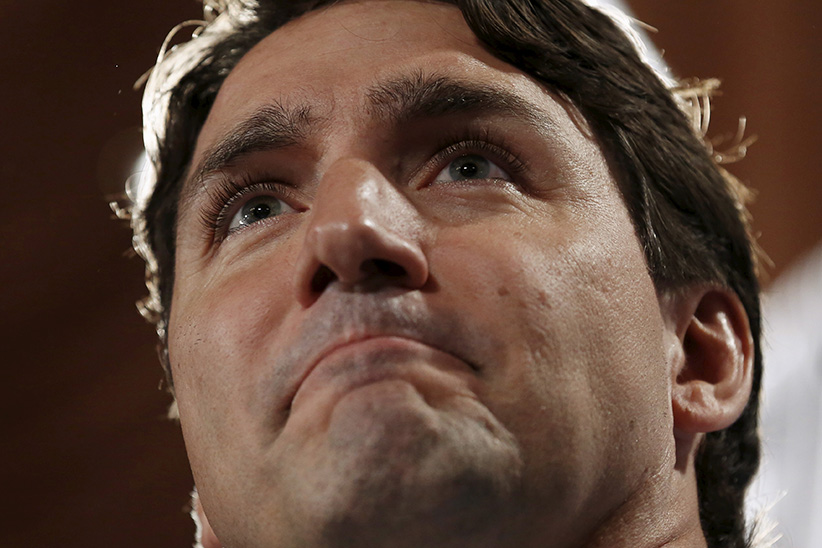How to fit in and stand out in Quebec
By criticizing cuts to culture and ‘centralization,’ Justin Trudeau is trying to win over Quebec. It’s a trickier proposition than it used to be.
Share

Listen to Paul Wells read his column, or subscribe to Maclean’s Voices on iTunes or Stitcher for on-the-go listening:
An eternal question political campaigns face is whether they can inflect the whims of fate in any way. It’s a question Justin Trudeau’s Liberals face right now in Quebec.
The Trudeau Liberals put out a French-language web ad in the first week of June. “I know the Conservatives’ cuts in culture worry people,” Trudeau says in voice-over, in French, as we see a shot of him standing onstage in a big empty concert hall. Salle Wilfrid Pelletier at Montreal’s Place des Arts, if I’m not mistaken.
Cut to Trudeau in interview footage. “Culture is part of our economy. It’s part of how we flourish.” Next shot: Trudeau shaking the hand of a smiling violinist and cellist in a dressing room. “Radio-Canada is essential. To see this institution threatened”—a dancer alone in a studio, looking vaguely worried—“it’s like seeing a threat to our identity.” Big crowd outdoors at Montreal’s jazz festival. “For me, culture, it goes to the heart of who we are,” Trudeau says. “You need a team with new ideas. That’s the Canada we want to build. I’m Justin Trudeau, leader of the Liberal Party of Canada.”
Justin Trudeau, friend of artists. From the herky-jerky syntax of the script, and by the way the audio cuts in and out, it’s pretty clear the voice track is spliced together from separate clips. The impression is confirmed by an earlier French-language ad, released a month ago, that took a different route to the same closing sentences. Indeed, to the same sound clip. “We have to create an economy that works for the middle class. That’s the Canada we want to build. I’m Justin Trudeau . . . ”
Justin Trudeau, friend of the economy. And splicing. Above all, friend of Quebec. The messages chosen for these ads, especially the cellist-and-dancer video, are designed to appeal to Quebecers, who dealt the Conservatives a fierce backlash in 2008 after Stephen Harper’s staff made light of some pre-election cuts to Canadian Heritage programs for touring artists. The bit about Radio-Canada makes sense if you recall that thousands of people marched last November across Quebec to protest against Radio-Canada cuts.
The only geographical entity Trudeau mentions in either ad is Canada, but his pitch, and his preoccupation, are more tightly focused. The website ThreeHundredEight keeps a monthly average of publicly available election polls. The Liberals bounced up and down around 32 per cent in Quebec for more than a year, good enough to keep them in first place for most of that time. But an eight-month slide left them at 25 per cent in May. Equally preoccupying is the decline among francophone voters, who determine the winner in most Quebec ridings outside parts of Montreal. From February to April, the pollster CROP found the Liberals losing eight points among francophone Quebec respondents.
Suddenly, new ads showing Trudeau worried about Radio-Canada and, apparently, the jazz festival. And a 40-minute interview for La Presse, in which he proclaimed that Tom Mulcair’s NDP—certainly the main obstacle standing between Trudeau and a Quebec comeback—is a “centralizing” party that doesn’t understand Quebec’s needs.
By now the word “centralizing” has had nearly all its meaning leeched away by generations of abuse at the hands of partisans of every stripe, but its appearance in Trudeau’s lexicon is intriguing. Several Liberal leaders—Louis St. Laurent, Pierre Trudeau, Jean Chrétien—used to stand proudly as the sorts of fellows who could defend the responsibilities and prerogatives of a strong central government. Probably some Liberals thought they were getting something similar when they chose Trudeau as their leader.
But this year just about every party running candidates in Quebec is against an Ottawa-knows-best federal government. Stephen Harper, whose seminal 2001 “firewall letter” was a manifesto against federal encroachment into provinces’ business, has now been Prime Minister for more than half of the longest-ever period of uninterrupted growth in federal transfers to the provinces. Mulcair complains Harper isn’t growing those transfers fast enough. And Trudeau says even Mulcair wants to leave too much clout at the federal level. One wonders why Gilles Duceppe wants back into federal politics, since his colleagues from other parties are competing so energetically to ensure nothing ever happens in Ottawa.
Any party has to believe it can battle out of a slump anywhere in the country. Trudeau must hope he is due for a change of momentum in Quebec. At 25 per cent of the popular vote in the province, he’d be way ahead of Michael Ignatieff’s 2011 score, but barely a point higher than the result Stéphane Dion obtained in Quebec in 2008. There is no path to power for the Liberals that has Trudeau doing only as well as Stéphane Dion in Quebec.
A rule of political thumb used to hold that parties with francophone Quebec leaders did well at home in federal elections. That rule didn’t work for Paul Martin in 2006, or even for Gilles Duceppe in 2011, thrown over for a party led by a Montreal-born anglo, Jack Layton, who’d made his career in the mouth of the Great Satan—or Toronto city council, as it’s also known. Native-son advantage ain’t what it used to be in Quebec. Trudeau’s problem isn’t that he carries the burden of his controversial father. He could probably use a little controversy at this point. Anything to stand out from all the other decentralists who worry about Radio-Canada.